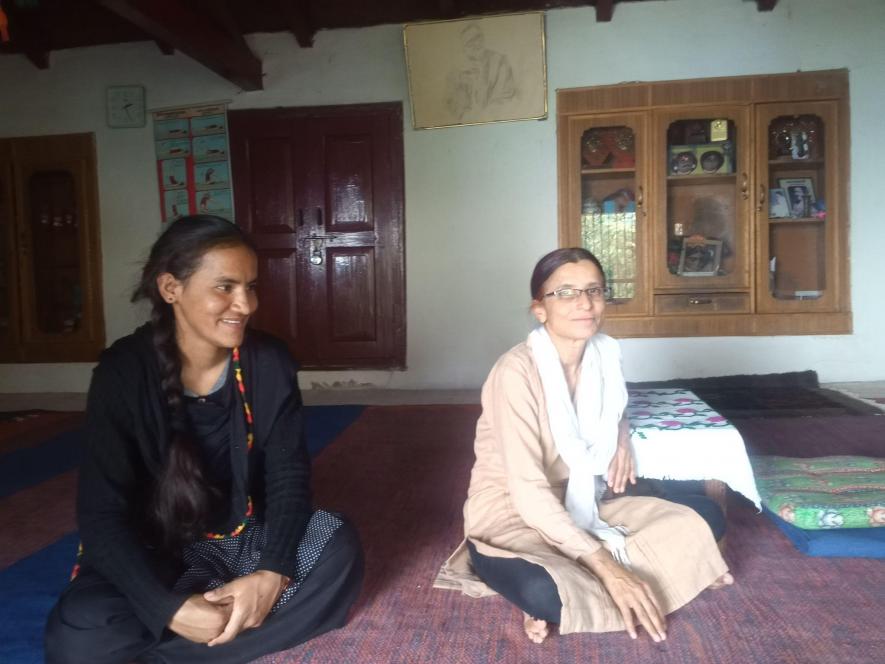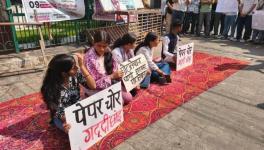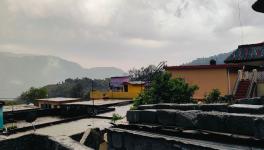76-Year-Old Gandhian Ashram for Girl Education in Kausani Lagging as it Struggles to Modernise

(Bina and Neema Vaishnav in the ashram)
One of the greatest challenges that families living in the hills face is providing education for their children. Government schools in hilly areas are distant from villages, specifically from the remotest and highest villages, from where it is difficult for children to traverse daily to attend school. Sometimes only one or two schools operate for the benefit of several villages.
In this context, education for women has been even more challenging due to gendered social norms and customs.
"I remember when I came to the hills long ago, I found it extremely difficult to get girl children to join our ashram for education," says David, the manager of Lakshmi Ashram, an alternative school in Kausani.
The ashram has been well-known around the hill station of Kausani for its impeccable work of providing education to girls in the Kumaon region of the state of Uttarakhand for the past seven decades.
"The custom of child marriage were still prevalent, and these hills were a centre of poverty, leaving aside women's education altogether," David continued. He said he came to the hills in 1972 and recalled how difficult it was to convince the families to send their daughters to study in the ashram.
"Nobody wanted to send their daughters to schools, though, in the last 50 years, we have seen a lot of change," David said, adding that "as patriarchal customs changed, families at least started sending their daughters to schools and our ashram as well. We have been at the forefront of providing them holistic education parallell to the general education they get in schools."
The ashram provides alternative education to girls who stay in its hostel; most of them also attend local government schools and colleges. The contribution of the ashram has been immense as it continues to take in students from across the Kumaon region and even a few from the Garhwal region.
Lakshmi Ashram was set up in 1946 by a British woman, Katherine Mary Heilman, popularly known as Sarala Devi. She participated in the Indian Independence movement by joining the growing anti-colonial nationalist movement led by Mahatma Gandhi in the 1930s. She became a disciple of Gandhi and followed his ideals of 'gram swaraj' that later inspired Lakshmi Ashram's philosophy.
"The aim of setting up the school was to provide education to rural girls in the Gandhian way, aiming for self-sufficiency in skill and self-confidence. They were trained to work together in the community and uplift other women; this was the spirit of Gandhian social work when Devi established it," said Neema Vaishnav, secretary of the ashram.
The ashram currently houses 46 children aged 12-20, who are provided hostel facilities. Most of the girls who study in the ashram are from underprivileged backgrounds. Daughters of widows, children with disabilities, children from dalit and tribal backgrounds or generally children of the lower classes in the villages.
The education provided by the ashram starts from the basics of learning Math, Science and English but goes beyond to include skills such as creative writing, weaving and knitting, cooking, etc.
"Taking care of cattle and learning about the ecological aspects of the hills and sustainable living are all part of their activities. We teach music as well," said Bina, a teacher in the ashram.
"Their days start early in the morning with exercises and yoga. We also teach them farming and vegetable farming, as the hills do not support grain farming such as wheat," said David.
The focus from the onset of the day is on inculcating physical activeness. Bina says that to achieve this, "post-breakfast, all girls and staff indulge in physical activities. Gardening, helping in the kitchen and cleaning the ashram are part of the daily routine. They collect firewood from the forest as well."
Social activism is a part of life for the students as they are involved in raising awareness of water conservation issues and conservation of forests and hills.
"The girls do nukkad natak (street theatre) by going to many villages and performing for the villagers, raising social awareness," Neema said. "An all-around, socially responsible child's development is the aim", adds David.
In the present scenario, the ashram is facing many challenges. All the forward movement of modernity, with the latest technologies and use of computers that provide the young an edge in employment opportunities, is lacking in the ashram teachings.
"We are lagging; even though we provide holistic education that makes the girls self-reliant, they may not be able to compete with our modernising country," Neema said. She adds that though there are computers in the institution, there is a lack of teachers.
"It is hard to get by teachers who are well-versed in teaching computers. We lack in funding as well," Neema said. The institution's funding happens through the Association of Lakshmi Ashram, located in Denmark. Still, Neema says that the funding is not enough to hire skilled teachers who can teach the girls programming languages.
"In general, we are still teaching them traditional skills and lagging in modern education," Neema adds.
The problem of finding proper teachers is ever-present for the ashram, and most of the teachers are volunteers. Not many want to commit to teaching the girls for the long term. "We want teachers to stay here for at least two to three years. But Kausani is such a remote place that nobody wants to commit for so long; hence we get volunteers who live near us but lack expertise," Neema said.
Even though the ashram aims to expand its reach and area to include more facilities, it simply lacks the funds and resources.
The girls who learn here and graduate from school and even college from here, usually after finishing their education, leave the ashram, laments Neema.
"They all seem to go away from the place, searching for opportunities in the city or simply returning to their home. Not many stay behind to enrich the community we have created here. There is a lack of willpower and belief in the community among the girls, especially in our fast-moving modern times," Neema adds. But she is still hopeful and believes in her work.
"I am satisfied that we can provide the most basic of education to the girls here, something that is very difficult to come across in the hills."
The writers are freelance journalists.
Get the latest reports & analysis with people's perspective on Protests, movements & deep analytical videos, discussions of the current affairs in your Telegram app. Subscribe to NewsClick's Telegram channel & get Real-Time updates on stories, as they get published on our website.
























